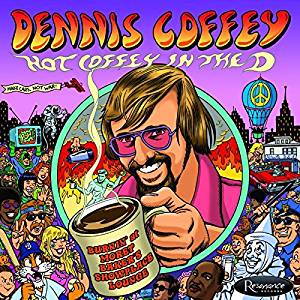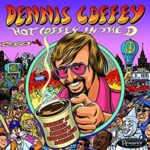Guitarist Dennis Coffey’s place in music history is solid. As one of the members of Motown’s legendary Funk Brothers, his contributions can be heard on iconic hits such as the Temptations’ “Cloud Nine,” “Ball Of Confusion” and “Psychedelic Shack,” the Supremes’ “Someday We’ll Be Together,” Edwin Starr’s “War” and Freda Payne’s “Band Of Gold” among others.
His creative energy didn’t begin or end there. In 1969, he started releasing solo material, which included the classic instrumental “Scorpio,” a song that seems as if it will never ever end and you don’t want it to. Displaying that he still has the chops and adding to his funky legacy, Coffey put out a stellar self-titled effort in 2011.
He returns with something new that’s actually something old. Recently discovered four-track reel tapes in Coffey’s basement have led to Hot Coffey in the D: Burnin’ at Morey Baker’s Showplace Lounge. The live album documents what Coffey and his bandmates – keyboardist Lyman Woodard and drummer Melvin Davis – had been doing in Detroit for the past two years.
These seven instrumentals from 1968 feature the electric trio jamming out on originals such as “Fuzz,” which finds Coffey stretching out the usage of his fuzz pedal, and “The Big D,” which sounds like a funky studio outtake, and covers of popular tunes at that time (Dusty Springfield’s “The Look Of Love,” Glenn Campbell’s “By The Time I Get To Phoenix,” which applies a groovy swing to the original, and Herbie Hancock’s “Maiden Voyage”).
At their core Coffey, Woodard and Davis are a jazz act stretching musically in ways that they couldn’t do during their day jobs as session musicians, but there is also the influence of their work via funky influences weaving throughout the arrangements.
The format and musical freedom found here plus the seamless improvisations evoke thoughts of Jerry Garcia and Merl Saunders leading the way during their time together and with Legion of Mary. Like those bands, Hot Coffey in the D presents the immense joy of playing while no stone was left unturned before a song reached its conclusion.
The packaging includes a 60-page booklet with essays and interviews with Coffey, Davis and Theodore plus comments by Bettye LaVette and music executive Clarence Avant (Sussex Records, Motown Records).
“Hot Coffey in the D” is likely the first of more unreleased shows based on Coffey’s discovery. If the others display the spark of this album, it will become a treasure trove of Motor City history.




No Comments comments associated with this post